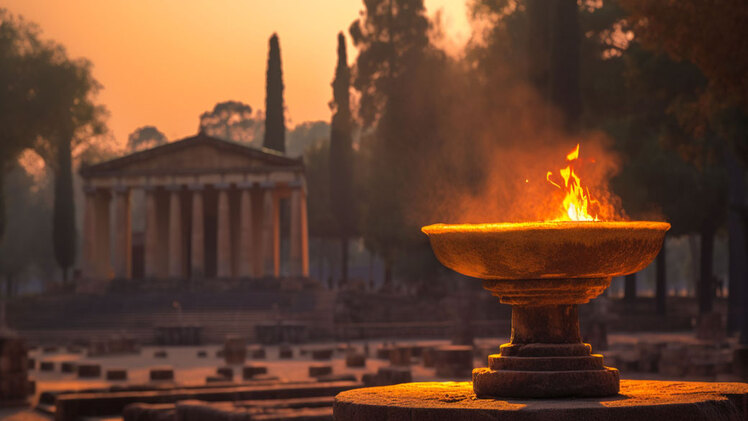The History Of Ancient Olympics

One of the most important occasions in ancient Greek history was the Ancient Olympics, which took place in Olympia, Greece. These contests were important in terms of religion and culture in addition to athletic ability. They began a custom that would last for generations, influencing the growth of athletics and the celebration of human achievement, and date back to 776 BCE.
Origins and History
Birth of the Olympics
The legends of gods and heroes are entwined with mythology and tradition to explain the origins of the Ancient Olympics. A common misconception is that Heracles, the mythical figure known for his valour and strength, invented the games. But according to historical accounts, the first Olympic Games were held in 776 BCE, which launched a tradition that would last for more than a millennium.
Ancient Greek Society
The Ancient Olympics were deeply ingrained in the fabric of Greek society, reflecting the values and ideals of the ancient Greeks. They were more than just sporting events; they were a celebration of physical prowess, competition, and the pursuit of excellence. Participation in the games was considered a privilege and an honor, with athletes representing their city-states with pride.
Early Olympic Events
The stadion, a foot race that took place over the whole stadium, was the only event offered at the first Olympics. The games’ varied talents and skills were reflected in the inclusion of new events over time. These featured competitions in track and field, boxing, chariot racing, and wrestling, each requiring a special combination of strength, agility, and strategy.
Athletic Competitions
Sports and Disciplines
There were many different sports competitions at the Ancient Olympics, including team and individual events. Competitors displayed their physical prowess and abilities, developed over years of training and dedication, in events including sprinting, jumping, throwing, and combat sports. These competitions’ feats of strength, speed, and agility enthralled spectators and inspired wonder.
Training and Preparation
It took more than simply skill to compete in the Ancient Olympics; one had to put in a lot of training and preparation. Athletes would train rigorously for months, honing their abilities and methods under the supervision of knowledgeable trainers. Athletes’ training plans changed based on the unique requirements of each competition, as they tried to reach their best in order to win.
Olympic Traditions
Ceremonies and Rituals
The Ancient Olympics were not merely athletic competitions but also religious festivals dedicated to the worship of the gods, particularly Zeus, the king of the Olympian gods. The opening ceremony was a spectacle of pomp and pageantry, featuring elaborate rituals, sacrifices, and processions to honor the gods and invoke their blessings upon the games. These ceremonies fostered a sense of reverence and awe among participants and spectators alike, imbuing the Olympics with a sacred significance that transcended mere sport.
The Olympic Flame
One of the most enduring symbols of the Olympics is the Olympic flame, which has its origins in the ancient rituals of the games. According to legend, a sacred flame was lit at the altar of Zeus in Olympia and burned throughout the duration of the games as a symbol of purity and divine favor. Today, the tradition of the Olympic flame continues, with the torch relay symbolizing the journey of peace and unity that the games represent.
Sacred Truce
To ensure the safe conduct of the games and the participation of athletes from across the Greek world, a sacred truce, known as the ekecheiria, was declared before and during the Olympics. This temporary cessation of hostilities allowed athletes, officials, and spectators to travel to Olympia without fear of conflict or violence, promoting the spirit of peace and cooperation that characterized the ancient Greek world.
Legacy and Influence
Impact on Ancient Greek Culture
The Ancient Olympics left an indelible mark on Greek culture and society, shaping the collective identity and values of the ancient Greeks. They served as a symbol of Greek unity and excellence, fostering a sense of camaraderie and pride among the city-states that participated in the games. The Olympics inspired works of art, literature, and philosophy, celebrating the virtues of athleticism, competition, and human achievement.
Modern Olympic Games
While the Ancient Olympics eventually declined and fell into obscurity, their legacy endured through the centuries, inspiring subsequent generations to revive the spirit of the games. In 1896, the modern Olympic Games were inaugurated in Athens, Greece, as a tribute to the ancient tradition. Since then, the Olympics have evolved into the largest and most prestigious sporting event in the world, uniting nations in the spirit of friendly competition and mutual respect.
Conclusion
The Ancient Olympics were more than just athletic contests; they were a celebration of human potential and the pursuit of excellence. From their humble origins in Olympia, they grew into a global phenomenon that continues to captivate and inspire people of all ages and backgrounds. As we marvel at the achievements of modern athletes on the world stage, let us remember the enduring legacy of the Ancient Olympics and the timeless ideals they represent.




Leave a Comment